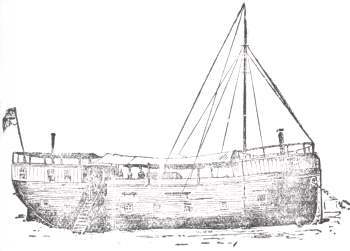Coastguard and Customs Officers
It may seem very strange to us now where the Customs and Coastguard service are very different agencies but for several hundred years they were one body.
Rescues from stricken vessels have taken place on the Essex cost ever since man began to use boats .
Co-ordination of rescues would be the responsibility of ships captains or in the case of a boat running aground the local JP or Squire.
Appointing a body to be responsible for rescue from wrecks only took place in 1809.
Smugglers from the continent were a problem from the 1600's and as a result the Board of Customs appointed customs officers in ports and fitted out Revenue ships to patrol the channel coast and deter smuggling.
By 1700 a formal force, called Riding Officers, to protect the coasts of Kent and Sussex had been appointed.
These Officers were to patrol the coast to catch the smugglers in the act of landing if they managed to avoid the Revenue Ships and Customs Officers in ports.
Not to be outdone the Board of Excise appointed it's own Revenue Ships and Riding Officers to cover the remainder of the country including Essex.
The two sets of Revenue agencies were unpopular with a public that became used to benefiting from smuggles goods and were at odds with each other.
In 1809 two more forces were added with formation of the Water Guard to patrol coastal waters in small boats and the Coast blockade to assist the riding officers.
The Water guard effectively was the forerunner of our modern coastguard by being given responsibility for saving lives in wrecks.
Essex proved attractive to smugglers given the many creeks and inlets used by the Thames barges and the marshy nature of the coast prevented riding officers patrols and made concealment difficult for groups of revenue men.
To help combat this Watch Vessels were introduced in greater number than anywhere else in the country effectively blocking the major routes in the Rivers.
 The watch vessel at Stansgate in
about 1880
The watch vessel at Stansgate in
about 1880
Watch vessels were a cross between barracks and a police station that provided a base for anti smuggling activity, lookout posts on the Rivers and a safe home for the families of the officers.
This was important as men were always posted at least 20 miles from their home to prevent collusion so they needed quarters and as they were quite unpopular with the residents of the area it provided a protection from intimidation.
An unexpected bonus was the introduction of new families to areas of rural Essex that had a static population.
What seemed an efficient layer of protection was made less effective by bureaucracy as the Navy controlled the Revenue ships and the Coast Blockade, The Board of Customs controlled the Riding Officers and the Treasury controlled the Water Guard.
The forces managed much duplication of effort and at times caused each other more problems then the smugglers!
Against a backdrop of increased smuggler activity and consequent loss in taxation income the Government mounted a review which suggested amalgamation
By 1831 all of the forces had been amalgamated into the Coastguard.
Although smugglers were the main priority the responsibility of saving victims of wreck remained .
In 1856 control of the Coastguard moved from the Board of Customs to the Royal Navy and with the reduction of smuggling emphasis was more focused on saving lives at sea.
By 1923 a more complex marine safety agency was required and the water based revenue collection needs had changed which meant that the responsibility for revenue was given to the new HM Customs and Excise Department and the Coastguard was given the responsibility for life saving rescue from wrecks and administration of the foreshore.




